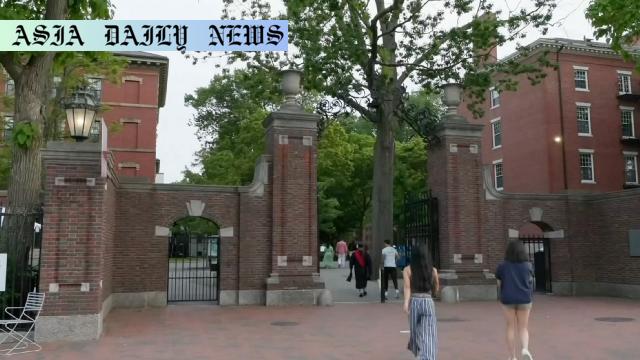Harvard Funding Threat: US administration’s letter cites violation of Title VI over antisemitism concerns at the university.
- Investigation cites Harvard for antisemitic harassment.
- Title VI violations may revoke federal financial resources.

Introduction: The Controversy at Harvard
Recently, Harvard University has faced severe scrutiny from the administration of former US President Donald Trump over allegations of antisemitic practices on campus. According to a recent investigation led by the administration’s Joint Task Force to Combat Anti-Semitism, the prestigious institution was found to be in violation of Title VI of the Civil Rights Act. This legislation prohibits discrimination based on race, color, and national origin. The report alleged antisemitism at Harvard, including the harassment of Jewish students and faculty. This article delves deeply into the situation, its implications for education funding, and the broader sociopolitical dynamics it highlights.
Accusations of Title VI Violations
The investigation conducted by the Task Force alleged that Harvard failed to effectively address complaints of harassment and marginalization targeting Jewish students. The instances of discrimination were categorized as ongoing and severe violations of Title VI. Specific allegations included the denial of access to campus spaces for both Jewish and Israeli students. Given these findings, the Trump administration issued a warning that federal financial support for Harvard would be fully revoked if the university did not swiftly implement changes to rectify the situation.
The pressure from the administration is unprecedented in scale. Federal funds, including billions of dollars in grants and the ability to enroll international students, have already been frozen. In response, Harvard released a statement asserting its commitments to combat antisemitism and stating that steps had already been taken to build a more inclusive campus culture.
The Funding Crisis and its Implications
The Trump administration’s firm stance has significant financial and operational implications for Harvard. Federal funding constitutes a critical component of the university’s annual budget. Should the financial freeze continue or escalate to a complete revocation, Harvard would face substantial challenges in maintaining its research programs, international collaborations, and its broader educational operations.
In addition, the imposed conditions may strain the university’s mission to maintain academic freedom and diversity. The administration has reportedly demanded increased surveillance of pro-Palestine student groups and a retreat from diversity, equity, and inclusion initiatives that have been central to Harvard’s recent policy reforms. Such directives have sparked heated debates among students, academic circles, and the general public about the balance between institutional accountability and the preservation of individual and academic freedoms.
Broader Sociopolitical Implications
The conflict between the federal administration and Harvard surfaces tensions that go beyond a single university. It highlights the politically charged environment surrounding issues of campus inclusion, free speech, and the rights of marginalized groups. On one side, the Trump administration’s actions underline a firm commitment to addressing antisemitism. On the other side, critics argue that the measures risk overreach and infringe upon academic independence.
The debate further showcases the polarized views in the United States regarding approaches to tackling sensitive social issues. For instance, while the administration prioritizes addressing antisemitism on campus, its demands to monitor pro-Palestine movements have raised questions of fairness and potential profiling of specific groups.
Harvard’s Public Response
In its defense, Harvard released a public statement addressing the accusations and investigations. The university emphasized its dedication to combating any forms of discrimination, including antisemitism. It claimed to have undertaken substantial measures prior to the federal investigation to ensure a safe and inclusive campus environment for all, though it fell short of specifying what changes had been made and their demonstrable impacts.
The statement also expressed optimism about ongoing deliberations with federal authorities to resolve the matter amicably. However, no concrete resolution has been announced yet. The university remains under continued scrutiny and pressure to implement immediate and significant changes.
Conclusion: The Way Forward
The situation at Harvard is emblematic of larger societal struggles to address deep-seated biases while preserving institutional freedoms. As the dialogue unfolds, it remains to be seen whether Harvard’s steps to address antisemitism will satisfy the demands of the administration. Moreover, resolving this matter may set a critical precedent for other educational institutions on handling similar issues under federal scrutiny.
For now, Harvard faces a monumental challenge—secured funding, academic freedom, and public accountability all hang in precarious balance. Decisive action, coupled with transparent communication and public engagement, may pave the way forward.



Commentary
Balancing Accountability and Institutional Independence
The developments surrounding Harvard and the Trump administration open a gateway to an important discourse about the balance between federal oversight and the autonomy of academic institutions. On one hand, tackling antisemitism is an absolute necessity, as no student should ever feel unsafe or marginalized. On the other hand, the means of addressing these issues should not trample on the freedom of speech, diversity initiatives, and independence that great educational institutions stand for.
This issue points to how sensitive and complex such scenarios can get, where federal policies intersect with the inner workings of universities. While the government holds the power of funding, institutions like Harvard hold the responsibility of fostering dialogues and promoting inclusivity. However, the heavy-handed approach can detract from long-term solutions, replacing constructive engagement with enforced compliance.
The Wider Societal Implications
This case goes beyond Harvard and dives into the global conversation about handling discrimination through policy. The intentional freeze of federal resources directed at the university showcases the potential misuse of policy mechanisms to push narratives or ideologies. Yet, it also underlines legitimate concerns governments may bring to the table about accountability and action-taking failure by large institutions with a societal role.
Public trust in such contentious issues often stems from transparency and collaboration—a trait that neither the Trump-endorsing administration’s task force nor Harvard arguably has fully embraced. At its core, addressing human rights related to antisemitism must avoid becoming politicized for the benefit of advocacy of outcomes.